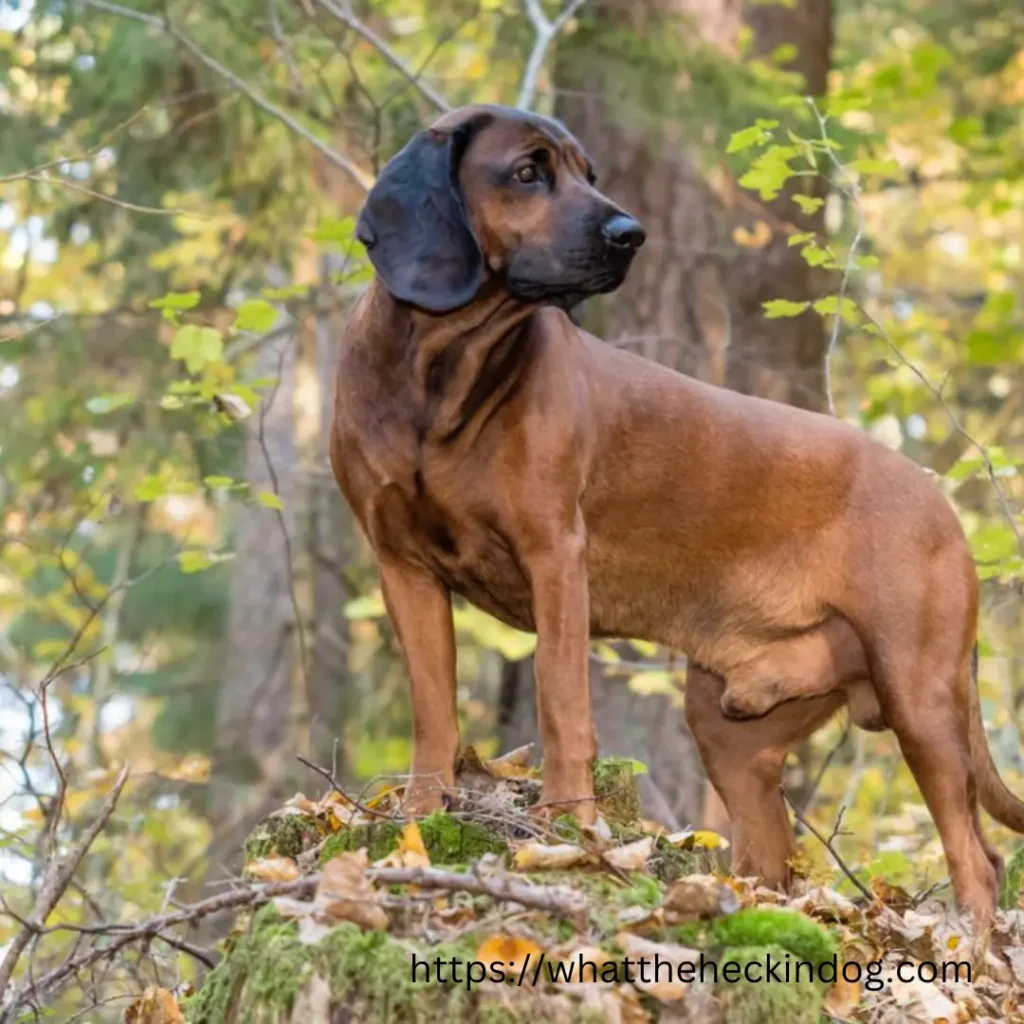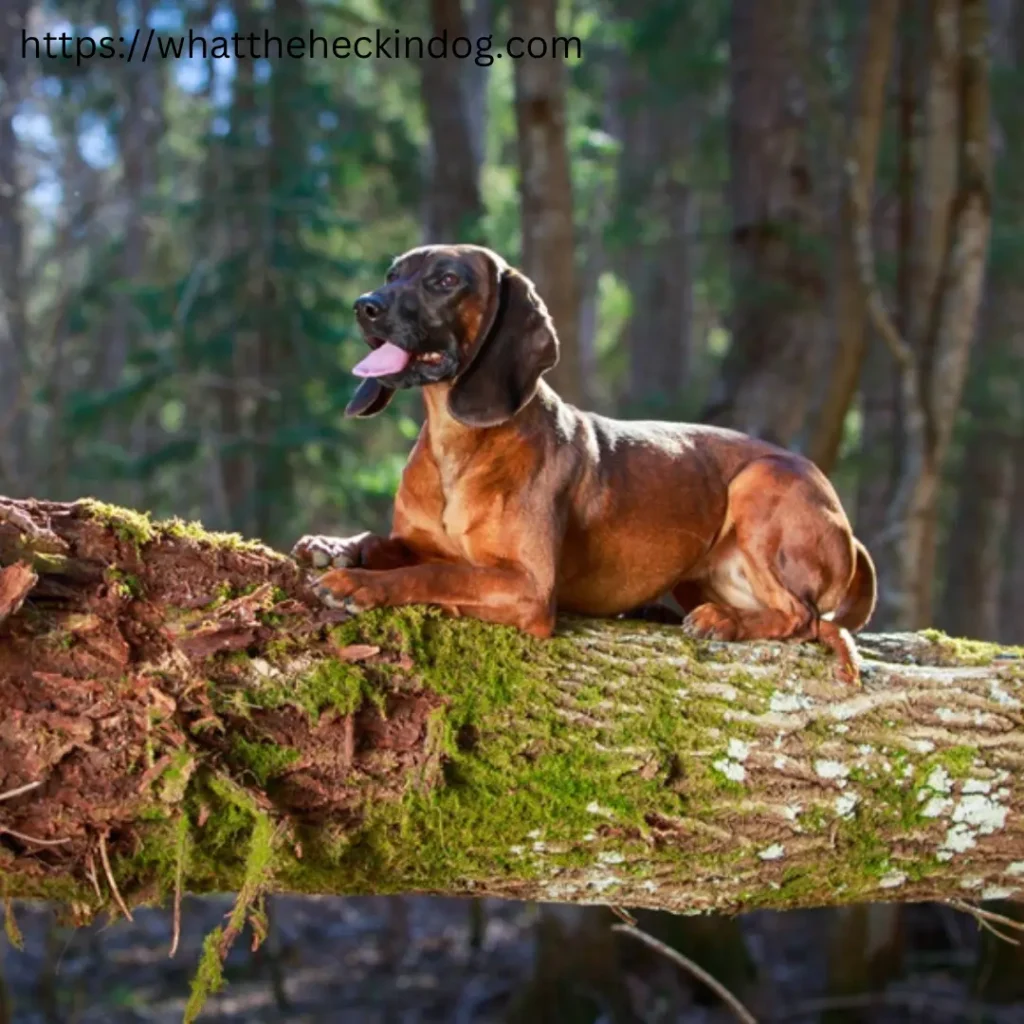Originally from Germany, the Bavarian Mountain Hound is a versatile and skilled hunting dog. This medium to large-sized breed, known for its remarkable tracking skills, has a robust coat with a black saddle. It comes in many shades of red. The Bavarian Mountain Hound, with its well-known devotion and friendliness, is a great addition to any busy family.
It looks to be a cross between a Hanover Hound, German Shepherd, Beauceron, Great Dane, Labrador Retriever, and Bloodhound. Despite having all these characteristics, this dog is incredibly loving and gentle, and they get along well with both children and adults. However, this dog requires a lot of exercise, and if they do not receive enough mental and physical stimulation, they may become depressed and even destructive.

Caring For a Bavarian Mountain Hound
Bavarian Mountain Hound Health:
With a lifespan of 10 to 14 years, the Bavarian Mountain Hound is generally a robust and healthy breed. They may be more susceptible than other dogs to certain diseases such as hip dysplasia and ear infections. Their general health is influenced by a balanced diet, maintaining a healthy weight and regular vet check-ups.
Bavarian Mountain Hound Grooming:
Bavarian Mountain Hounds require little maintenance in the grooming department because of their short coat. Frequent brushing reduces shedding and maintains the health of their coat. Regular dental treatments, ear examinations, and nail trimming should be an integral part of their grooming regimen.
Bavarian Mountain Hound Exercise:
Bavarian Mountain, being a hunting breed, are high energy dogs that need frequent exercise to maintain their mental and physical stimulation. Take them on regular strolls, playdates, or other activities that make use of their innate tracking instincts. A happy and balanced Bavarian Mountain Hound is also a result of mental stimulation provided by puzzle toys and training activities.
https://www.wisdompanel.com/en-us/dog-breeds/bavarian-mountain-hound

Bavarian Mountain Hound Training:
Because of their intelligence and desire to please, German Mountain are usually open to receiving instruction. For their proper development, early socialization based on positive reinforcement and regular training are essential. Because these dogs have a keen sense of smell, including scent exercises in their training can be fun and psychologically challenging. Their natural qualities can be harnessed to the fullest with firm but compassionate instruction, resulting in a docile and accepting friend.
Bavarian Mountain Hound Nutrition:
A balanced, nutritious diet is important to the general health of Bavarian Mountain. It is advisable to feed your dog a premium food that is specially formulated to meet the nutrient requirements of their size, age and activity level. Obesity can be avoided by keeping an eye on weight and modifying portions accordingly. Access to fresh water on a regular basis is essential. Talking with a veterinarian guarantees a custom fit.
Bavarian Mountain Hound Colors
The distinctive coat color of the Bavarian Mountain is usually a rich red with a black saddle. The breed has a distinctive appearance due to its vivid and unique coloring, which emphasizes its traditional and functional purpose as hunting dogs. Fertile and dark colors combine to create a beautiful and robust appearance that highlights the substantial structure of the breed.
Bavarian Mountain Hound Size
The medium to large sized Bavarian Mountain Hound breed has a strong and well-proportioned build. The following size limits apply to adult Bavarian Mountain Hounds:
Height:
Females typically stand between 17 to 19 inches (43 to 48 cm), while males typically stand between 18.5 and 20.5 inches (47 to 52 cm).
Weight:
Generally, females weigh between 33 and 44 pounds (15 and 20 kg), and males between 44 and 55 pounds (20 and 25 kg).
While these dimensions offer a wide range of possibilities, individual dogs may fall well outside of them.

Lifespan Of Bavarian Mountain Hound
The average lifespan of a Bavarian Mountain is between 10 and 14 years. As with any breed of dog, there are many variables that can affect an individual’s lifespan, including genetics, general health, diet, exercise, and access to veterinary care. A balanced, nutritious diet, frequent checkups, and an active, motivated lifestyle can all increase the longevity and general health of a Bavarian Mountain Hound.
